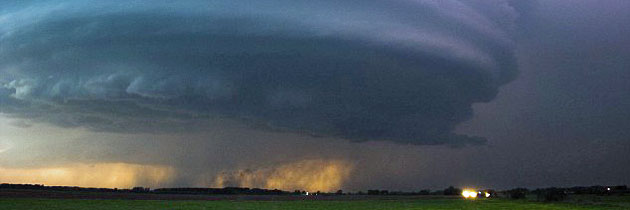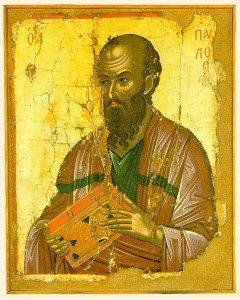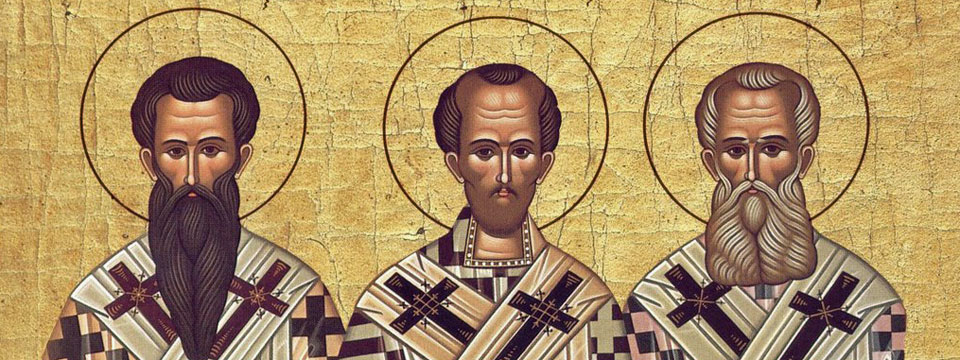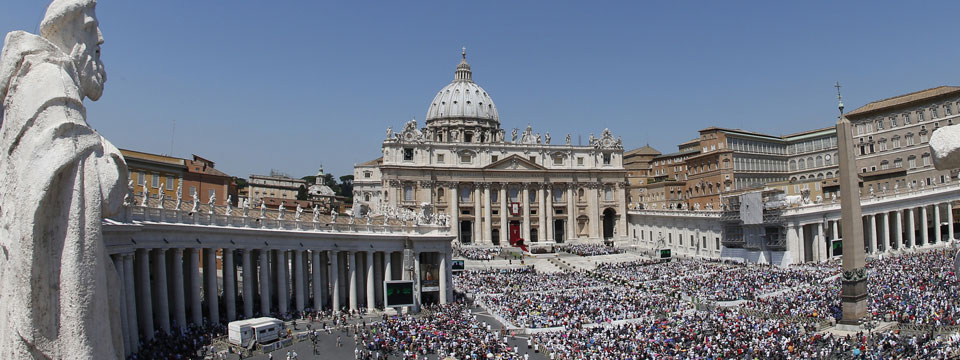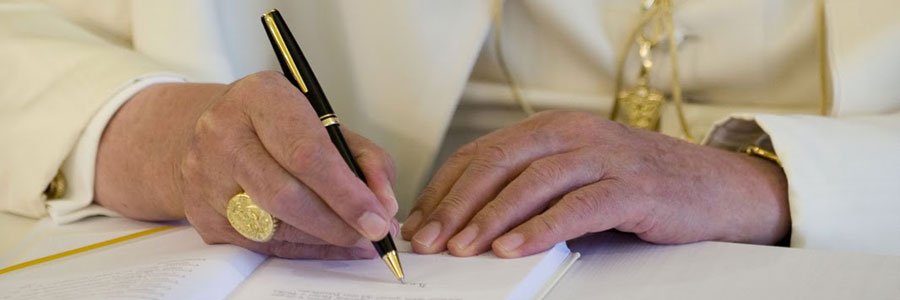The anthropological focus
of the modern dilemma
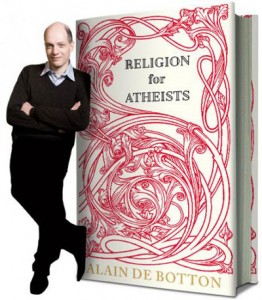 The Swiss-English philosopher Alain de Botton, in his book Religion for Atheists, says that we can have the music, architecture, illuminated manuscripts, pilgrimages and fellowship, and even the good works of religion, without its claim to truth. Such an assertion could only be made in a post-Nietzschean era, and is well expressed in the line: ‘God is dead. Can I have his stuff?’{{1}}
The Swiss-English philosopher Alain de Botton, in his book Religion for Atheists, says that we can have the music, architecture, illuminated manuscripts, pilgrimages and fellowship, and even the good works of religion, without its claim to truth. Such an assertion could only be made in a post-Nietzschean era, and is well expressed in the line: ‘God is dead. Can I have his stuff?’{{1}}
De Botton thinks that culling these living flowers from the rotten vine of religion might assuage some of the ills of secularised life, which shows itself woefully incapable of providing such benefits in and of itself. If he thinks (and many with him) that the ‘trappings’ of faith can help with the meaninglessness, anxiety and loneliness produced by secularism, yet not because the faith is true, we may well ask: ‘Why, then, do they work if it isn’t?’ Such an inquiry may be instructive for our understanding of the workings of grace, and how our efforts ought to be directed in the new evangelisation. This is because de Botton’s claim reveals something of our anthropological ‘structure’, that there is an inescapable dimension of human life which is the most essential, and the most human, and that the denial of it leads not to our flourishing but to our detriment, even to our destruction. The so –called ‘trappings’ of faith ‘work’ for a reason, and not by chance.
The aim in this presentation, is to examine the heart of what the Second Vatican Council termed the ‘modern dilemma’ (GS 9,10) and the near desperate situation that has arisen as a result of it; how the human heart under the paradigm of the machine, impermeable to grace, is under a form of slavery that is age-old yet circumscribed and exacerbated by new conditions; that despite this, grace is the stronger, and how the new-evangelisation, if it is to be at all effective, must operate on this very specific anthropological terrain that is the battlefield of the modern dilemma.
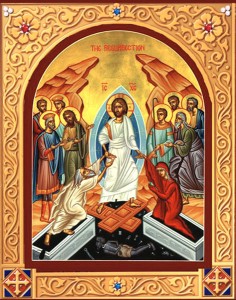
Starting afresh from a renewed encounter with the Risen Christ, the principle aim of the Year of Grace, inspired by Novo Milennio Ineunte.
The year of Grace
In attempting to describe with greater practical focus what might be the purpose of the Year of Grace, we could say that the distinction between what has been termed the objective redemption (Christ’s redemptive work) and the subjective redemption (the appropriation of the grace of that redemptive work by the individual) can offer some assistance. Obviously, the redemption to be found in the Person of the Word made flesh, and mediated by the Church in the sacraments, her teaching, and her various forms of ministry (governance), is the same now as it was from the day of Pentecost. It is rather the conditions affecting the working-out of the subjective redemption which undergo the mutations of historical circumstances.
The mystery of grace lies in the intimate mutual co-operation of the Divine action and human freedom. All the controversies and heresies that have arisen concerning our justification and sanctification by grace follow from the difficulties involved in this mystery of co-operation. (They have been marvelously presented by Dr Gerard O’Shea and Fr Peter Joseph already, so there is no need to repeat now what they have already covered so well.)
We may perhaps summarise to some extent the doctrine on grace by saying that it is neither owed by God (it is the gratuitous gift of the love of God), nor can it be merited by man. The pendulum swing of heresies in history from one extreme to the other, occurs because of the failure to keep these two polar complementary aspects in their harmonious inter-relation. The curious novelty about our present situation lies in the fact that the heresy of universal salvationism (that God owes salvation to everyone, as if – as the New Oxford Review once put it – we’re all sailing off to heaven in a beautiful pink sailoat with rainbow sashes for sails) has somehow come to be symbiotically associated with its polar opposite, the heresy that we can merit salvation by own own efforts (found in the ‘worship’ of technology, and symbolised by the limp-wristed throwing of contraceptives/condoms at problems sexual).{{2}} This is due in great part to the headlong development of technology, which has on the one hand enhanced remarkably the various human potentialities, while on the other, is seen to go step by step with an atrophying of personal moral and spiritual development.
The Second Vatican Council described this situation in terms of the modern dilemma:
[T]here appears the dichotomy of a world that is at once powerful and weak, capable of doing what is noble and what is base, disposed to freedom and to slavery, progress and decline, brotherhood and hatred. Man is growing conscious that the forces he has unleashed are in his own hands and that it is up to him to control them or be enslaved by them. Here lies the modern dilemma. The dichotomy affecting the modern world is, in fact, a symptom of the deeper dichotomy that is in man himself. (GS 9,10)
The problem is therefore not a new one, but an age old drama (“beneath all that changes there is much that is unchanging”, GS 10) being played out with a welter of new props cluttering up the stage. G.K. Chesterton characterised the situation as being one in which there is a multiplication of faster and ever more streamlined racing cars, all revving and smoking, but caught in gridlock. An examination of how we arrived at this juncture is required, in order that the appropriate response may be found.
The genesis of the modern dilemma
The passage to modernity may be seen (under one of its aspects, viz. the development of the material sciences and its effect on the concept of the truth) to consist in two essential phases:
- the first, in which the idea pagan antiquity had elaborated of the cosmos was purified by faith in Christ, so that the universe came to be seen as rationally made, with constant laws that may be investigated by the human mind and whose forces might be harnessed for the betterment of life;
- and the second, in which the ‘turn to the subject’ was hi-jacked by fourteenth century nominalism, which then provided the background to the Cartesian-Kantian rationalism with which we are all familiar.
The latter’s misdirecting of the benefits of the former, around 1660 began to break up the formerly integrated understanding of the universe as metaphysically rational into a mechanistic world-view, resulting in a recrudescence of stoic like ethics propped up by much more precise and effective empirical sciences. A flat utilitarianism would serve as midwife to the birth of modern man’s small soul (as Nietzsche described it). The event of ‘modernity’ has altered the relation between the cosmos, its transcendent Source, and its human interpreter.{{3}}
Fr Stanley Jaki osb, dedicated the last decades of his life to demonstrating how it was in fact faith in Christ that enabled the discovery of the scientific method, which led to the flourishing of discoveries in what is described as ‘the birth of science’ between 1250 and 1650. Jaki claims that this was due to biblical faith in the Creator which in that period permeated for the first time an entire culture.{{4}} While the ancient Hindu, Chinese, Mayan, Egyptian, Babilonian and especially Greek cultures could all boast of valuable starts in science, scientific endeavour suffered manifold stillbirths since their religions did not possess the synthesis of faith and reason that derives from faith in Christ. Other cultural achievements have any number of parallels with other civilisations, but not in the case of the development of the scientific method. The birth of science developed into a self-sustaining enterprise, sparking the industrial and then technological revolutions, becoming in our own time a veritable explosion of digital capacities.
At the same time, side by side with these developments, the effects of rationalism brought about a new mindset in the cultures deriving from the post-reformation trauma. While nature had been understood as part of a metaphysically ordered whole, the shift towards subjectivism sparked by fourteenth century nominalism meant that in the sixteenth century, scientific enquiry began to posit a neutered objectivity which gained precision in measurement, but which drained the external world of its ontological interiority (i.e. substances come to be not from God’s creative act, but from a projection of the human mind).{{5}}
Turning inward, the human subject sought to establish itself as the basic testing point for all reality, and thus the guarantor of certitude, and this effected both the tendency to render human consciousness absolute, and the reliance on mechanistic philosophy to define the limits and character of the objectively real. While at first it appears that consciousness retreats from objectivity, it infact co-opts objects through the demand for mathematical precision, implicitly absolutising it, thus giving rise to the modern sense of subjectivity. The hegemony of the legitimate science of mechanism, under the philosophies of absolutised consciousness, became dualistic and mechanistic philosophy: if it is possible and effective quantitatively to read nature like a machine, the temptation was and is to say that nature is made up after the manner of a machine.{{6}} The facts of science came to viewed under a false philosophy.”{{7}}
While the benefits of the birth of science (which had developed into a self-sustaining enterprise) continued, becoming in our own time a veritable explosion of technological capacity, the disintegration of the faith-reason synthesis and the parallel difficulties in understanding the grace of the subjective redemption, have together brought us to our present crisis. In the sweep of history this crisis takes in, among other things, attacks on the validity of perennial metaphysics, the sundering of the unity of the Church, the reduction of the scope of human reason to the merely empirical by the European Enlightenment (better described as an endarkenment, at least under that aspect), the pretensions of laicité, the genocides of the twentieth century and bio-ethical genocides of the twenty first, and so on down to the present. If you will forgive the rather Keating-esque observation, it is a crisis we had to have, in the manner of a crisis of adolescence, in which once it arrives there’s nothing for it but to boat into the eye of the storm and pray that grace will triumph. It also means that it is a crisis of peculiarly Christian character, which explains to some extent both the tendency to openness and good will towards Jews and Muslims while simultaneously displaying the opposite of these traits to those who profess faith in Christ, and instructs on the way we are to respond to the nature of the crisis – as a Christian heresy.{{8}}
The cultural disintegration of our age, at first severing economic, then social and family life from the religious sense, have brought about a cultural situation – no longer confined to the developed world, in which the space for the graced, free human act is being steadily eclipsed with every passing second. A week without a Sabbath has taken hold of the culture, through the economic to the social and then familiar levels, and is now reaching into the ontology of the individual person.
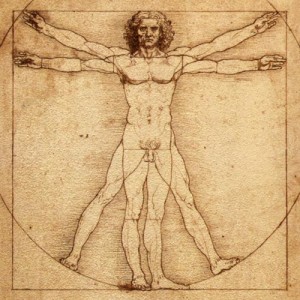
This image exemplifies the blend of art and science during the Renaissance and an example of Leonardo’s keen interest in proportion. This picture represents a cornerstone of Leonardo’s attempts to relate man to nature. He envisaged the great picture chart of the human body he had produced through his anatomical drawings and Vitruvian Man as a “cosmografia del minor mondo” (cosmography of the microcosm). He believed the workings of the human body to be an analogy for the workings of the universe. It is also believed by some that Leonardo symbolized the world of matter by the square and the spiritual dimension of human existence by the circle.
The near eclipse of the Human Act (by its substitution with technology)
With the advance in the control of the forces of nature unaccompanied by a parallel moral and ethical growth, we have arrived at a situation in which the very benefits of technological advance now coil back upon us.
Human activity proceeds from man: it is also ordered to him. When he works, not only does he transform matter and society, but he develops himself. He learns, he develops his faculties, and he emerges from and transcends himself. Rightly understood, this kind of growth is more precious than any kind of wealth that can be amassed. It is what man is, rather than what he has, that counts. Technical progress is of less value than advances towards greater justice, wider brotherhood, and a more humane social environment. Technical progress may supply the material for human advance but it is powerless to actualize it.{{9}}
It is in this last affirmation that we see how the free human act can come be eclipsed. Any number of thinkers have pondered this, but representative among them would be Georges Bernanos, who was sharply critical of the inroads into personal freedom both by governments and technology, and observed a flight to conformism brought about by the globalisation of media communications and the standardisation of production. Expressions of this in the arts were abhorred also by Evelyn Waugh, and cultural expressions at a more general level brilliantly critiqued by Theodore Adorno, the post-modern atheist who devastatingly showed up modernity’s contradictions. The Thomistic distinction between the actus hominis and the actus humanus, in which intellect and will are not fully engaged in the first but enter into explicit act in the second, reveals the precise anthropological terrain on which the modern dilemma militates against genuine human advance.{{10}}
The tendency to apply the methods proper to the control of the forces of nature to personal self-mastery, ignores this distinction, and indicates an inadequate understanding of the human person. In the greatly increased material prosperity there occurs, said Bernanos, a ‘blissful servitude’, which dispenses from the moral effort of willing and acting. Modern man’s love of systems allows the abdication of personal moral responsibility, since choices are then by and large made for him. Romano Guardini described ‘mass man’ who has no desire for independence or originality, neither liberty of external action nor freedom of internal judgement. Why should he if he has never really experienced them in their inner truth?
“Directing human rationality so vigourously towards the technical, man has duped himself by his very cleverness…he has degenerated from being the master inventor of the machine, to being a slave mechanic.”{{11}}
That is, man’s own capacity to transform matter, especially honed by means of the scientific method, and his own failure to recognise the greater importance of moral and spiritual progress, has transformed the project of self-mastery (which includes rationally harnessing the forces of nature, but is dependent on the greater importance of the development of the self, well summed-up by Einstein’s observation that ‘the problem is not the atom bomb but the heart of man’), into a mechanically driven, self imposed, moral and spiritual slavery. This is one of the reasons why it is so difficult in ministry to awaken souls to the reality of sin. The loss of the sense of sin derives, in part, from the ‘liberation’ from some of its effects, which in the past served as unavoidable reminders of the sin committed, of the call to repentence and reception of sacramental absolution.
T.S. Eliot, in The Hollow Men, describes in familiar terms that the world comes to an end (perhaps here to be taken in a teleogical and not simply a chronological sense) that the world ends with a whimper and not with a bang. There seems also to be an allusion to a passage in Dante’s Inferno, in which Limbo is considered the first circle of hell, and the souls detained there are incapable of hell, but also incapable of calling on God for redemption. They merely dance around the “prickly pear” – a desert imagery employed to express the terrain of the soul barren of life of any kind, good or bad.
The machine has thus become the stereotype of modern and post-modern culture, and by extension of all of reality, though, it is not recognised since ModMan has been trained to think like a machine. (The resolution of the modern dilemma requires a critique and resolution of the understanding of human reason, mechanised by modern rationalism). The graced, free human act seems to disappear, as there simply seems to be no need for it. The spiritual enslavement that follows, means that persons become
Prisoners of the fleeting moment, they seek to “consume” the strongest and most gratifying individual experiences at the level of immediate emotions and sensations, inevitably finding themselves indifferent and “paralyzed” as it were when they come face to face with the summons to embark on a life project which includes a spiritual and religious commitment…{{12}}
Though a slave to sin, bound by spiritual indifference and paralysis because of existential incarceration in fleeting sensations, this slavery has been rendered “blissful” thanks to material prosperity’s misuse as a substitute for moral advance in the human act. The contemporary tendency of applying the methods proper to the domination of the forces of nature to the project of personal self-mastery, not only, therefore, do not bring about true development, but in so far as they may be used to substitute for it, constitute a renunciation and loss of authentic human development of the self. The nature of human freedom that emerges from these clarifications made in the light of greater acknowledgement of the anthropological truth about man, reveals a peculiar threat to human freedom, not present to the same degree in previous ages, since the possibility of the misuse of technology is greater now than in the past.
A renunciation and loss of the notion of human activity’s principle aim in self-development, tantamount to a renunciation of the call to moral responsibility and with it an attempted substitution of technology, would bring about a new form of slavery in thinking and living.{{13}} This would be all the more insidious for its deceptive appearance, clothed as it would be in the trappings of material prosperity. As an example, Waugh in Brideshead Revisited depicted Rex Motram, an ambitious Canadian entrepeneur, as one in whom there are a few faculties highly developed, but “the rest simply isn’t there”, “he isn’t a real person at all”. When he attempts to marry Lady Julia Flyte, his conversion is purely utilitarian, and his surprise at the obstacle of his divorce is met with the response: “Well, who do we have to see to get it fixed. If it’s a matter of money I’ll pay.” Later, Julia reflects that “there’s a whole world of things that we understand and he doesn’t.”
The rise of practical atheism
The drama of modern and post-modern man consists in the fact that he has physically survived his own spiritual extinction.{{14}} The mechanised form of human life, impermeable to grace, creates as a result a cultural vacuum in which a new cultural phenomenon has arisen, that of “practical atheism.”{{15}}
[t]he problem is not so much atheism, but indifference and practical unbelief, it induces him to live ‘as though God did not exist’, idolizing material goods, the achievements of work, the fruits of power….{{16}}
The graced human act tends to disappear, and from large swathes of the population, not because of open rebellion against the demands of the moral law, but by a substitution with a ‘consumer existence’.
The ‘culture wars’, though it is rarely adverted to, and even less often openly discussed, really involve two diametrically opposed anthropologies – two accounts of the nature of man – struggling for dominance.{{17}} It is not so much doctrines on the Trinity, the Incarnation, the Mother of God, the sacraments, etc., that are directly attacked now, but the nature of man. The other doctrines are affected in so far as they are viewed through a flawed, or through an adequate anthropology.
Starting from a false conception of the nature of man, the mind continually sees everything in a false light. Its whole object is to become something that it is really not, and can never be…with human nature undefined, nothing else is definable.{{18}}
Not only do human persons under the false light of a flawed anthropology appear as only things, but there is formed a new form of slavery in thinking and living that constitutes the modern dilemma.{{19}}
The individual, all bound up in himself, this man who makes himself not only the centre of his every interest, but dares to propse as the principle and reason of all reality, finds himself even more bereft of that ‘supplement of soul’ which is all the more necessary to him in proportion as a wide availability of material goods and resources deceives him about his self-sufficiency. There is no need to fight against God; the individual feels he is simply able to do without him.{{20}}
C.S. Lewis summed up well the impossibility of our keeping the moral law without grace as follows:
[F]aith in the…higher sense…arises after a man has tried his level best to practise the Christian virtues,and found that he fails, and seen that even if he could he would only be giving back to God what was already God’s own. In other words, he discovers his bankruptcy….Now we cannot…discover our failure to keep God’s law except by trying our very hardest (and then failing). Unless we really try, whatever we say there will always be at the back of our minds the idea that if we try harder next time we shall succeed in being completely good. Thus, in one sense, the road back to God is a road of moral effort, of trying harder and harder. But in another sense, it is not trying that is ever going to bring us home. All this trying leads up to the vital moment at which you turn to God and say, ‘You must do this. I can’t.’{{21}}
It is precisely this vital realisation that is missed in the context of the modern dilemma. The slavery to the Law about which St. Paul uttered a cosmic cry of desperation on behalf of the human race in chapter 7 of the Letter to the Romans, wanting to do what is right and good but being unable to do it, is not experienced (at least in nothing like its fulness), since there is no perceived need to even try. Technology will fix it, in its effects if not in its cause. St. Paul indicates by the slavery of the Law the inner appetites’ disorder and impelling to break the Law, and by freedom from the Law the liberation from the desire to break it thanks to justification by grace.
“I can will what is right, but I cannot do it. For I do not do the good I want, but the evil I do not want is what I do….For I delight in the law of God, in my inmost self, but I see in my members another law at war with with the law of my mind and making me captive to the law of sin which dwells in my members. Wretched man that I am! Who will deliver me from this body of death? Thanks be to God through Jesus Christ our Lord!” (Rom 7: 18b-19, 22-25a.)
Why bother striving to live according to the Law (Torah) of God, when it is conceivable that all the negative consequences could one day be simply and effectively dealt with? We all know that examples abound of how utterly deceptive this notion is. Mary Eberstadt’s book Adam and Eve After the Pill accurately and devastatingly collects together the overwhelming empirical evidence showing the destruction that has followed in the wake of the sexual revolution. As with the Hydra of ancient Greek mythology, with the attempt to resolve moral problems by treating their effects with technological solutions, the underlying unresolved problem throws up still more effects, unforeseen and ever more untreatable. The free human act is eclipsed, not by tyrannical force, but by a willing renunciation. Justification and sanctification by grace appears a relic of bygone ages, something with which we need now no longer be bothered. As previously stated, the modern dilemma is all the more insidious and deceptive for its being clothed in the trappings of material prosperity.
Cor Inquietum
However:
[t]he Church knows full well that her message is in harmony with the desires of the human heart …Her message, far from impairing man, helps him develop himself, by bestowing light, life, and freedom. Apart from this message nothing is able to satisfy the heart of man: You have made us for yourself, O Lord, and our hearts are restless until they rest in you.{{22}}
There is a splendid passage from one of the letters of Pascal:
What else does this craving, and this helplessness, proclaim but that there was once in man a true happiness, of which all that now remains is the empty print and trace, which he in vain tries to fill from all his surroundings, seeking from things absent the help he cannot obtain in things present. But these things are all inadequate, because the infinite abyss can only be filled by an Infinite and Immutable Object, that is to say, only by God Himself.
This craving to which the empty print and trace bears witness is the reality to which de Botton and those like him refer, though they may not be conscious of it, or if they are, they try to ignore it. We know from St. Thomas that the precepts of the natural law can never be completely erased from the human heart, (and by extension, the intuition of the Author of the natural law), though they can be greatly deformed. We ought not take for granted the proclamation of the kerygma for granted: that by His death and resurrection, Christ has freed us from the slavery to the law. Part of the proclamation of our liberation in Christ today entails awakening souls to the reality of moral slavery they experience without being fully conscious of it, in order to then present justification by grace.
The irrepressible longing for God, and the effects of the modern dilemma combine to constitute the cultural context for the new evangelisation. It is on this terrain of the human soul that the new evangelisation must operate, or it will simply be ineffective. I rejoiced one day when during a telecast of the cricket, an advertisement on giving up smoking promoted the principle that every small victory in overcoming the addiction to nicotene increased the capacity for the final renunciation – which may be seen as being in microcosm, the problem that faces us today. The essential message being that without grace, authentically free human acts are impossible. The third acclamation after the consecration (in the newly re-translated missal) powerfully places before us the challenge of the subjective redemption, by stating the fact that by his resurrection the Lord has set us free, but that we call on him to save us now, the free co-operation on our part being implied. The principle is well expressed in the old axiom: we are redeemed, but we are not yet saved. We all know well the renewed interest in the questions surrouding celebration of the Sacred Liturgy, a happy parallel among believers to the interest in the benefits of religion showed in a representative fashion by de Botton’s book. These aspects of the beauty of the faith may be seen to be like the body, which remains inanimate without the soul, and which is the longing for the truth that is Christ Himself. Pugin stated, in defense of his neo-Gothic style that:
The Mass, whether offered up in a garrett, or a Cathedral is essentially the same sacrifice, yet when surrounded by all the holy splendour of Catholic worship, those august mysteries appear ten times more overpowering and majestic. While the sense is rapt in ecstasy by outward beauty, the divine truths will penetrate the soul thus prepared for their reception.
While the ‘trappings’ have their function, the radiant inner form of the Truth is the crucial element. The claim that can be made is that the trappings of faith ‘work’ not by chance but for a reason, and that reason, that Logos, is Christ.
Living off spent Catholic Capital
The present situation can continue only for so long, before the effects of misused technical development so pile up on an exasperated post-modern culture that the dilemma can no longer be ignored by the “will to disbelieve.”{{23}} (Let us hope this arrives sooner rather than later). The attempt to replace the graced human act with the facts of science viewed under a flawed anthropology, will fail. What remains to be seen is how long it continues to maintain the present façade.
[H]umanism cannot substitute for super-Humanism. The modern world, with its modern movement, is living on Catholic capital. It is using, and using up, the truths that remain to it out of the old treasury of Christendom, icluding of course many truths known to antiquity but chrystallised in Christendom.{{24}}
If that was the case when Chesterton wrote this passage roughly eighty years ago, what is to be said of our current state? Newman appealed to the dynamic of development as it obtains in things generally in order to illustrate the nature of the development of doctrine. We can extend his analysis to our own sitation of moral decline within the context of technological development.
The abounding of iniquity is the token of the end approaching…decay is the state in which there is no violent or vigourous action at all, whether of a conservative or a destructive character, the hostile influence being powerful enough to enfeeble the functions of life, but not to quicken its own process….Thus, while corruption is distinguished from decay by its energetic action, it is distinguished from a development by its transitory character.{{25}}
The human heart’s thirst for God, unslakeable by any created reality as a substitute, together with the ever increasing drama of the modern dilemma, opens up for us the opportunity for the proclamation of the Gospel in our day. We know we have the answer: Christ Himself. But He must be proclaimed in a manner that responds to the precise manner in which He saves. This requires, among other things, the unmasking of the two errors militating against the grace of the subjective redemption: salvation by technology in so far as it becomes a substitute for the free co-operation with grace in the human act (which can be seen as a variation on the Pelagian salvation by one’s own efforts); or a kind of automatic universal salvationism which denies both the gratuity of grace and the mystery of our own graced, willing co-operation. The inability of technology to save us is becoming more obvious by the day, despite the ‘will to disbelieve’ it. The appeal to human freedom in the subjective redemption, corresponds to the modern ache for liberation, while still acknowledging our utter need of grace.
The Pauline ‘slavery of the law’ will mean that when there eventually comes about a general awakening in the realisation that acting contrary to the moral law simply doesn’t and cannot work, the attempt to keep it will illustrate dramatically that it is impossible without grace.
![All religion “is founded in one way or another on the sense of sin.” Where there is no sense of guilt, where conscience is replaced by a mere moral sense, there will be no true religion. But where there is a consciousness “on the one hand, of the infinite goodness of God, and, on the other, or our own extreme misery and need,” there will also be an anticipation that a revelation has been or will be given. If somebody, then, “has longed for a revelation to enlighten him and to cleanse his heart, why may he not use, in his inquiries after it, that just and reasonable anticipation of its probability, which such longing has opened the way to his entertaining”… “There is only one Religion in the world which tends to fill the aspirations, needs, and foreshadowing of natural faith and devotion…It alone has a definite message addressed to all mankind…[Christ] fulfils the one great need of human nature, the Healer of its wounds, the Physician of the soul…Natural Religion is based upon the sense of sin; it recognizes the disease, but it cannot find, it does but look out for the remedy. That remedy, both for guilt and for moral impotence, is found in the central doctrine of revelation, the mediation of Christ…that gift of staunching and healing the one deep wound of human nature.](http://clergy.asn.au/wp-content/uploads/2013/12/john-henry-newman-232x300.jpg)
All religion “is founded in one way or another on the sense of sin.” Where there is no sense of guilt, where conscience is replaced by a mere moral sense, there will be no true religion. But where there is a consciousness “on the one hand, of the infinite goodness of God, and, on the other, or our own extreme misery and need,” there will also be an anticipation that a revelation has been or will be given. If somebody, then, “has longed for a revelation to enlighten him and to cleanse his heart, why may he not use, in his inquiries after it, that just and reasonable anticipation of its probability, which such longing has opened the way to his entertaining”… “There is only one Religion in the world which tends to fill the aspirations, needs, and foreshadowing of natural faith and devotion…It alone has a definite message addressed to all mankind…[Christ] fulfils the one great need of human nature, the Healer of its wounds, the Physician of the soul…Natural Religion is based upon the sense of sin; it recognizes the disease, but it cannot find, it does but look out for the remedy. That remedy, both for guilt and for moral impotence, is found in the central doctrine of revelation, the mediation of Christ…that gift of staunching and healing the one deep wound of human nature.{{26}}
Tout est grâce
What are we to do, we who observe the drama unfolding on a world-wide, even cosmic scale, yet who are so limited before the dimensions of so great a crisis? All seems grey and unredeemable. St. Therese of Lisieux famously said: All is grace! (I was privileged to be present in Rome when she was made a doctor of the Church in 1998. This phrase was repeated often in the positio) She experienced, she said, all the temptations of the materialists, yet thanks to heroic faith was able still to see that grace is real, despite all the apparent indications to the contrary.
Bernanos, in his Diary of a Country Priest, took this up and worked it into the narrative of a country parish priest, apparently unsuccessful in his ministry, who by means of his (at times anguished) personal fidelity, bears witness to the reality made known by faith: that grace is the stronger. He is sent into a spiritually depressed and largely indifferent parish, has to endure the often petty criticisms, misundertstandings and even false accusations of the parishioners. He feels that his best is as nothing, is plagued by a sense of futility and tends to bring misfortunes upon himself. “You’re sad even when you smile” says one of the children who mock him during catechism class, to which he replies: “I am sad because God is not loved enough.” As he comes to die from a stomach tumor, he believes himself to have been a complete failure. But the reader is able to discern, beyond the dying priest’s personal darkness, a moving and eloquent witness, effective in way he could never have anticipated, let alone imagined. There is the suggestion that he glimpses this as he lies dying. He whispers, as if only coming to see and understand at the last: “Grace is everywhere. Grace is everywhere.”
It is the world in miniature, representative of every parish, and a microcosm of the task that falls to priests everywhere – and together. No doubt, the inspiration for the novel is drawn to significant degree from the life of St. John Vianney, whom we now honour and call upon as our patron saint. We could call to mind also among the many examples of faithful priests, that of the founding chairman of the ACCC, who passed away last year, Fr Rod Brae. It was estimated that more the three thousand people attended his funeral. In his homily, Bishop Anthony Fisher op remarked that when he went to visit Fr Brae in hospital, on his death bed, the lines of people waiting outside to see him, did so not because they wished to bid him ‘farewell’, but because they wanted him to hear their confessions. Let us add our own, no doubt much smaller, witness – yet not for that reason any less necessary, to the cloud of witnesses who accompany us invisibly. On the cusp of the marshalling of ecclesial witnesses for the new evangelisation, the prospects appear difficult, more difficult than the Church’s diminished forces in the West seem able to front. Yet grace is the stronger, and our proclamation is in accord with the deepest desires of the human heart.{{27}}
Julia, in the arching shape of her conversion, at first acknowledges that religion was the one thing she wanted to give her child, thoug it hadn’t seemed to do her much good. “Odd,” she says, “wanting to give what one had lost oneself.” We, of course, know that the theological virtue of faith remains even when the state of grace is forfeited. If the modern dilemma is a form of heresy, then perhaps turning to the one who is fully grace: Tu sola interemisti omnes hereses in mundo.
May our Lady Help of Christians, Our Lady of Victories intercede for us in the year of grace.
[[1]]Zac Alstin, God is dead! Can I’ve his stuff?, at www.mercatornet.com, Monday 20 February, 2012. Cf. also Stephen K Bush’s blog, where he wrote: “I don’t believe in God, but I miss him,” writes Julian Barnes in Nothing To Be Afraid Of. That could almost be the mission statement behind Alain de Botton’s Religion for Atheists, a review copy of which made its way on to my Kindle (proof perhaps that God exists, and S/he likes me). It is a fantastic, fantastic book that I would recommend to everyone, particularly, if, like me, you don’t have a faith, but often would quite like one. My mother is an Anglican vicar, which all but guaranteed that I would grow up an atheist. I think there’s something about growing up ‘above the shop’ that makes you look twice at the merchandise.”[[1]]
[[2]]Debates over the translation of ‘pro multis’ into ‘for many’ rather than ‘for all’, in the new English translation of the ordinary form of the Roman Rite, also in Italy last year and recently in Germany, illustrate how much effect a translation can have on the understanding of articles in the creed. That Christ died for all without exception in no way detracts from the individual’s free embracing or appropriation of that salvation in the ‘subjective redemption’, or the free rejection of it.[[2]]
[[3]]Louis Dupré, The Passage to Modernity: An Essay in the Hermeneutics of Faith and Culture (Yale: New Haven, 1993), 248, 249.[[3]]
[[4]]Cf. S. Jaki, Science and Creation: from eternal cycles to an oscillating universe (Scottish Academic Press: Edinburg, 1986), vi-viii, 336-357. Also, The Saviour of Science (Scottish Academic Press, Edinburgh, 1990). This volume presents faith in Christ as making possible not only the salvation of man personally, but with him, his creative activity, specifically the material sciences. A re-worked edition of Science and Creation, it provides many new points of interest, generally in the realm of realist epistemological consequences of faith, and their bearing on the “scientific endeavour”. Cf. also Rodney Stark, The Victory of Reason: how Christianity led to freedom, capitalism, and Western success, (Random House: New York 2006) 16-17. [A related point of interest is the work of Joseph Needham, historian of Chinese civilisation. “Only three years before his co-author Alfred North Whitehead proposed that Christianity provided the basis for the pursuit of science, Bertrand Russell found the lack of Chinese science rather baffling. From the perspective of his militant atheism, China should have had science long before Europe….As conceived by Chinese philosophers, the universe simply is and always was. There is no reason to suppose that it functions according to rational laws…Chinese intellectuals pursued ‘enlightenment’, not explanations. This is precisely the conclusion reached by the very distinguished Joseph Needham, the Oxford historian of science who…concluded that the failure of the Chinese to develop science was due to their religion, to the inability of Chinese intellectuals to believe in the existence of laws of nature because ‘the conception of a divine celestial lawgiver imposing ordinances on non-human Nature never developed…It was not that there was no order in Nature for the Chinese, but rather that it was not an order ordained by a rational personal being, and hence there was no conviction that rational personal beings would be able to spell out in their lesser earthly languages the divine code of laws which he had decreed aforetime. The Taoists, indeed, would have scorned such an idea as being too naive for the subtlety and complexity of the universe as they intuited it.’” Joseph Needham, Science and Civilization in China, 6 Vols. (Cambridge: Cambridge University Press, 1954-84), 581, cited in Rodney Stark, The Victory of Reason: how Christianity led to freedom, capitalism, and Western success, (Random House: New York 2006) 16-17. These comments of Needham are all the more significant for the fact of his professed Marxism. Jaki noted that the “work first to be mentioned concerning the fate and fortunes of science in Chinese civilisation is the monumental study of J. Needham and his collaborators….While the work is unsurpassed for its wealth of material, its interpretative sections are heavily biased by Needham’s avowed Marxism.” Science and Creation, op.cit., footnote 2 page 46. Needham’s admission should be acknowledged as having significant bearing on the question of the cultural conditions necessary for the flourishing of the scientific method.][[4]]
[[5]]The established fact of Heisenberg’s principle of the impossibility of totally accurate quantitative measurements, ought to serve as a constant reminder of the metaphysical ‘background’ to every thought, and not just of every scientific undertaking. “Scientific abstraction” works only when there is an implied understanding of a rationally made universe, with constant laws of physics which can be discerned by the human mind, and whose potentialities may be explored for the betterment of human life. These factors, as Jaki showed, derive from belief in the Creator God revealed in Scripture. Cf also DL Schindler, The Given as Gift: Creation and Disciplinary Abstraction in Science, Communio (Spring 2011), Vol. XXXVIII, no. 1, 52-102. The Newmanian epistemological distinction between the implicit and explicit dimensions of human reason seems to be a particularly effective approach to re-expanding the scope of human reason reduced to the merely empirical in rationalist accounts. Cf. John Henry Newman, Fifteen Sermons Preached Before The University of Oxford (University of Notre Dame Press, Indiana, 1997). Especially the Preface to the Third Edition and Sermon XIII.[[5]]
[[6]]Kenneth Schmitz, At the Centre of the Human Drama: The Philosophical Anthropology of Karol Wojtyla/John Paul II (Catholic University of America Press: Washington, 1993) 131-134.[[6]]
[[7]]Hilaire Belloc, Essays of a Catholic, (?) 148.[[7]]
[[8]]“[A] radical sort of Enlightenment culture…takes an absolute understanding of inidividual freedom as its point of departure, a freedom that ought to be safeguarded by society. The internal contradictions that undermine such a point of departure in the right to freedom, however, often go unnoticed….A culture of individual freedom has ultimately led to freedom’s self-destruction and to a unique dogmatism with universla pretensions. This is accompanied by a radical relativism that in its turn has resulted in a dogmatic intolerance-currently being presented in the form of ‘political correctness’.” Lieven Boeve, Europe in Crisis: a question of belief or unbelief? Modern Theology 23:2 April 2007, 213. Boeve offers this as a summary of his reading of J. Ratzinger, “Eine nichtkonfessionelle christliche Religion? Reflexionen im Anschluss an den Vorschlag von Senatspräsident Pera” in Marcello Pera and Joseph Ratzinger, Ohne Wurtzeln: Der Relativismus and die Krise der Europäscen Kultur (Augsburg: Sankt Ulrich Verlag, 2004), 115-145, 137.[[8]]
[[9]]VCII, 934. Maurice Blondel (suspected in his lifetime as being of modernist tendencies, but later vindicated, at least to some degree) in the light of correspondence he received from Pope Pius X), in his examination of human action (L’Action), intended to illustrate how human activity, when closed-in on the merely empirical and cut-off from the transcendent aspect of the human act, is doomed to ontological frustration (a philosophically accurate description of what we would call ‘hell’).[[9]]
[[10]]ST, I-II, qq. 6 ff.[[10]]
[[11]]Romano Guardini, The Lord (Ignatius: San Francisco), 189.[[11]]
[[12]]John Paul II, Pastores dabo vobis, 7. In Evangelium Vitae 22 he observed: “[W]hen the sense of God is lost man no longer grasps his transcendent character, enclosed in the narrow confines of his physical nature, he is somehow reduced to being a mere ‘thing’.”[[12]]
[[13]]Cf. GS 4.[[13]]
[[14]]Rocco Buttiglione, Karol Wojty?a: the thought of the man who became John Paul II (Eerdmans: Michigan 1997), 11.[[14]]
[[15]]“Although, on the one hand, Christianity has found its most influential form in Europe, we must also say, on the other hand, that Europe has developed a culture that most radically contradicts not only Christianity, but the religious and moral traditions of humanity as well.” J. Ratzinger, Europe in the Crisis of Cultures, Communio: International Catholic Review, Vol. 32 (2005), 348.[[15]]
[[16]]“The spiritual drama that the Second Vatican Council considered as one of the most serious problems of our times (GS 19), sees a silent distancing of entire populations from religious practice and even from any reference to the faith. The Church today is confronted more by indifference and practical unbelief than with atheism…a diffuse presence, almost omnipresent, in the culture. Less visible, it is more perilous…. It is a veritable sickness of soul which induces to live ‘as though God did not exist’, a neo-paganism that idolises material goods, the achievements of work, and the fruits of power.” Where is Your God? Responding to the Challenge of Unbelief and Religious Indifference Today, Concluding Document of the Plenary Assembly of the Pontifical Council for Culture, 2004.[[16]]
[[17]]Cf. The debates over the nature of marriage. In an especialy accute way, the logos of human nature is at stake, and from it a vision of the whole of reality. If it falls to the state to define human nature and enact laws for the defense of human rights worked out in accordance with such a definition, we may wonder how far off a resurgence of totalitarianism may be.[[17]]
[[18]]Cited in W., Martin, The “New” Age Under Orage (London, 1967), 215. Cited, in turn, in Aidan Nichols, Chesterton as Theologian (Sophia Institute Press: New Hamphsire, 2009) 162.[[18]]
[[19]]GS 4, 10.[[19]]
[[20]]Pastores dabo vobis, 7.[[20]]
[[21]]C.S. Lewis, Mere Christianity (Harper Collins: London, 2002) 145-146. The Catechism of the Catholic Church (St. Paul’s: Strathfield, 1997), 483, cites the Council of Trent in paragraph 1993 explaining the co-operation between grace and human freedom thus:
Justification establishes co-operation between God’s grace and man’s freedom. On man’s part it is expressed by the assent of faith to the Word of God, which invites him to conversion, and in the co-operation of charity with the prompting of the Holy Spirit who precedes and prserves this assent: “When God touches man’s heart through the illumination of the Holy Spirit, man himslef is not inactive while receiving the inspiration,since he could reject it; and yet, without God’s grace, he cannot by his own free will move himself towards justice in God’s sight.” (DS 1525)
Again in paragraph 2001, the work of both the preparation of grace and the completion which follows:
The preparation of man for the reception of grace is already a work of grace. The latter is needed to arouse and sustain our collaboration in justification through grace, and insanctification through charity. God brings to completion in us what he has begun, “since he who completes his work by cooperating with our will began by working so that we might will it.” (St. Augustine, De gratia et libero arbitrio, 17: PL 44, 901) “Indeed we also work, but we are only collaborating with God who works, for his mercy has gone before us. It has gone before us so that we may be healed, and follows us so that once healed, we may be give life; it goes before us so that we may be called, and follows us so that we may be glorified; it goes before us so that we may live devoutly, and follows us so that we may always live with God: for without him we can do nothing.” (St. Augustine, De natura et gratia, 31: PL 44 , 264)[[21]]
[[22]]GS 21.[[22]]
[[23]]Cf. Mary Eberstadt, Adam and Eve After the Pill: Paradoxes of the Sexual Revolution (Ignatius: San Francisco, 2012) Chapter 1.[[23]]
[[24]]G.K. Chesterton, The Thing, (?) 22.[[24]]
[[25]]John Henry Newman, Essay on the Development of Christian Doctrine (Notre Dame, Indiana, 1989) 203-25.[[25]]
[[26]]John Henry Newman, Essay in aid of a Grammar of Assent, 253, 272, 274, 276-77, 299, 313; in Ker, Newman On Being a Christian, (HarperCollins: London, 1990), 13-14.[[26]]
[[27]]Cf. GS 21.[[27]]

